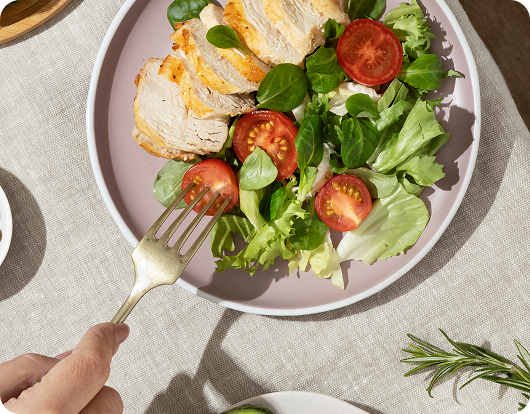Dietary Changes for Incontinence
Support better bladder and bowel control through simple, strategic nutrition

How Diet Affects Incontinence
Managing incontinence effectively can require thoughtful dietary changes alongside prescribed treatments. Many foods and beverages can irritate your bladder or affect your bowel movements, potentially worsening symptoms.
Your daily eating habits play a significant role in how your body functions, and can directly impact the severity of urinary or bowel incontinence. By adjusting your diet strategically, you can ease bladder irritation, regulate bowel function, and reduce the frequency of leakage episodes.
How Diet Affects Incontinence
Managing incontinence effectively can require thoughtful dietary changes alongside prescribed treatments. Many foods and beverages can irritate your bladder or affect your bowel movements, potentially worsening symptoms.
Your daily eating habits play a significant role in how your body functions, and can directly impact the severity of urinary or bowel incontinence. By adjusting your diet strategically, you can ease bladder irritation, regulate bowel function, and reduce the frequency of leakage episodes.

Understanding Pelvic Floor Exercises
Pelvic floor exercises are designed to strengthen and tone the muscles that support your pelvic organs over time.
These muscles provide support to organs like the uterus (in women), bladder, small intestine, and rectum. When properly conditioned, they help you control urination, bowel movements, and even improve sexual function. Regular training can also support posture and lower the risk of pelvic organ prolapse.
Diet Changes for Managing Incontinence
The impact of what you eat is often greater than you think. While receiving treatment for incontinence, it’s essential to be mindful of your food choices.
Consuming irritants can counteract treatment progress, while the right dietary adjustments can complement your care plan and support long-term relief.
Foods to Avoid for Incontinence
Some foods and substances are known to irritate the bladder or disrupt bowel function. To help manage incontinence, it’s best to reduce or eliminate:
Caffeine
Alcohol
Carbonated drinks
Artificial sweeteners
Spicy foods
Highly acidic foods
Processed foods
Foods to Consume
Certain nutrients and whole foods support better bladder and bowel control. Incorporating the following can help regulate your symptoms and improve your overall health:
Vitamin D – Helps strengthen pelvic floor muscles and improve nerve function. You can get Vitamin D through safe sun exposure and foods like egg yolks, fortified dairy, and fatty fish (salmon, tuna, mackerel).
Magnesium – Supports nerve and muscle relaxation. Found in nuts, seeds, leafy greens, fish, beans, bananas, and avocados.
Fiber – Prevents constipation and helps relieve pressure on the bladder. Good sources include oats, legumes, fruits, vegetables, and whole grains.
Antioxidants – Help reduce inflammation and promote bladder function. Foods like berries, spinach, and kale are rich in antioxidants.
Changing Lifestyle Habits for Managing Incontinence
Dietary adjustments work best when combined with lifestyle changes. Certain habits can enhance your results and reduce symptoms more effectively:
Hydration – Drink water consistently in small amounts throughout the day. Avoid consuming large volumes of fluid at once and reduce intake before bedtime to limit nighttime bathroom visits.
Meal Timing – Avoid trigger foods late in the day or before long outings. Instead, eat smaller, more frequent meals to support bowel regularity and avoid putting pressure on the bladder.
Pay attention to how your body responds to specific foods or drinks, and adjust accordingly to help reduce flare-ups or discomfort.
Why Patients Trust Northwest Continence Center
We take a science-based, compassionate approach that puts your comfort and results first.
Advanced Axonics Therapy
A minimally invasive solution that restores nerve communication for lasting relief.
Personalized, Science-Based Care
Every treatment plan is tailored to your unique needs using proven medical approaches.
Experienced, Specialized Providers
Our experts are trained in continence-focused procedures and neuromodulation techniques.
Judgment-Free Patient Support
We create a respectful, compassionate environment where you feel safe and heard.
We’re More Than Just a Clinic
We understand that incontinence can be emotional and isolating. That’s why we’re committed to making your experience safe, respectful, and empowering. Every visit is designed to make you feel heard and supported.

Let’s find the right solution together.